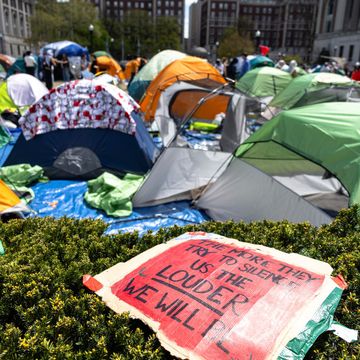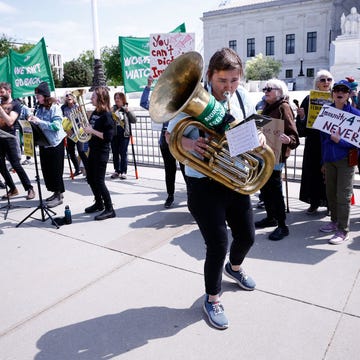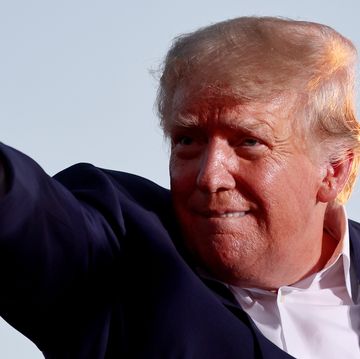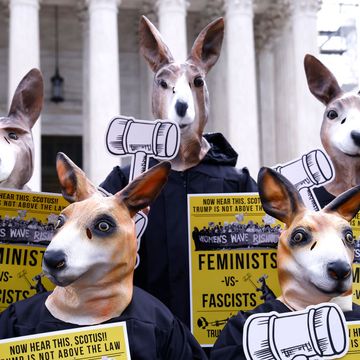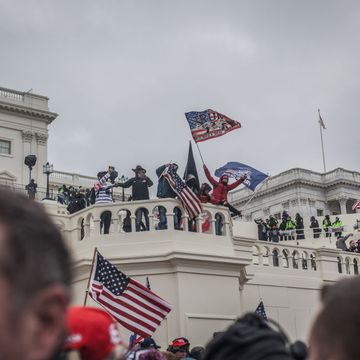It is my considered opinion that, as far as the simple process of voting goes, the World's Last Great Democracy couldn't organize a two-car funeral if you spotted it the hearse. The primaries on Tuesday night were an endless carnival of blunders, cock-ups, and general mayhem. This is the first election cycle we've had since John Roberts declared the Day of Jubilee and gutted the Voting Rights Act. These two things are not coincidental. The good folks at the SEIU have done a great job aggregating the various atrocities.
For example, Native Americans, the last Americans to obtain the right to vote, face a staggering array of obstacles. In Alaska, for example, Native villages can be as much as 150 miles from a polling place, and that only by boat or airplane. There is no consistent national policy on whether or not tribal identification cards are recognized under the spate of new voter-ID laws that passed in the wake of the 2007 decision upholding an Indiana law and that became a flood after Roberts and the Court declared the Day of Jubilee seven years later. The isolation of many Native communities often prevents people who are trying to vote from receiving the legal advice they need to protect their right to the franchise. And that is only the most extreme example of the chicanery that is going on.
In Wisconsin, for example, they passed a stringent ID law, but they did so while including in the law a provision by which the state would spend money on a detailed voter-education program so that citizens would be familiar with the new requirements. Well, the law passed, and you can probably guess what happened next.
But Wisconsin has failed to appropriate funds for the public education campaign. The result is that thousands of citizens may be turned away from the polls simply because they did not understand what form of identification they needed to vote. Wisconsin's failure to fund these public-service ads comes after a clash between the Government Accountability Board, the nonpartisan agency responsible for producing voter education materials, and the Republican-controlled legislature. In October, the agency met with Republican State Senator Mary Lazich, who was a primary sponsor of the voter ID bill in 2011, to inquire after funding and received a tepid response. The board told Lazich that it would need $300,000 to $500,000 from the state legislature to broadcast advertisements. The legislature had twice appropriated money for public information campaigns during the 2012 and 2014 election cycles, but the ads barely hit the airwaves before court injunctions delayed the law from going into effect. According to Kevin Kennedy, the board's director and general counsel, Lazich thanked the board for the information, but didn't make any promises. Lazich did not respond to requests for comment from ProPublica.
Meanwhile, in the now relentlessly insane state of North Carolina, their new voter-ID law worked exactly the way it's supposed to work. Let's hear from some satisified customers from a while back, shall we?
"Voting is so important to me because my dad's dad was born a slave," Colbert recounted. "And if you want to change something, you have to vote." A mistake by the DMV after he changed addresses cost him his vote. "It made me feel like I had been robbed," Colbert said.
And that's not even taking into account the fun in the sun that everybody had in Arizona, where there weren't enough polling places to go around because there were too many voters, which ought not to be a problem in a functioning democracy, but which now is a problem because of the Day Of Jubilee.
A review by The Arizona Republic, however, found the biggest contributor to the election-day chaos was a decision by Maricopa County officials to reduce the number of polling places as a cost-saving measure. Only Maricopa County saw long lines to vote in the presidential preference election, as it is officially known, even though the other Arizona counties had similar demands from independent voters to cast provisional ballots. Wednesday morning, Maricopa County Recorder Helen Purcell walked back her blaming of independent voters and said she was responsible for the debacle."We certainly made bad decisions, and having only 60 polling places, didn't anticipate there would be that many people going to the polling places," she said. "We were obviously wrong—that's my fault." In 2012, the county operated 200 polling places for the presidential primary. In 2008, there were 400. Pima County had 130 polling places on Election Day, compared with only 60 polling places in Maricopa County. This is despite Maricopa having four times the eligible voters for the presidential preference election.
It's going to be much worse this November, and probably worse every other November after that until we decide that none of these things is merely accidental, and that none of these episodes is merely a clerical or administrative error. They are the result of a deliberate national campaign to restrict the franchise in new and different ways, all of which devalue our democracy, and all of them a shame to our national honor. We are doing this to ourselves.

Charles P Pierce is the author of four books, most recently Idiot America, and has been a working journalist since 1976. He lives near Boston and has three children.


